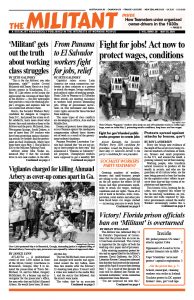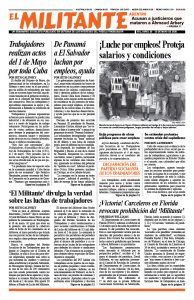“This is for the Militant, you take donations, right?” trucker Crystal McIntosh told James Harris at a truck drivers protest in Washington, D.C., May 10. Like others at the action she appreciated the coverage of their fight in the Militant — the only newspaper that provides a voice for working people’s struggles and explains how we can extend and advance them.
Harris, the Socialist Workers Party candidate for delegate to Congress from D.C., had joined the action to offer solidarity, learn more about what drivers face and introduce them to the Militant and the party. McIntosh, from Wessington Springs, South Dakota, is one of more than 100 truckers who have been protesting against sharpening attacks by brokers and the government on their livelihoods. Many have been there since May 1. She kicked in $20 to the Militant Fighting Fund.
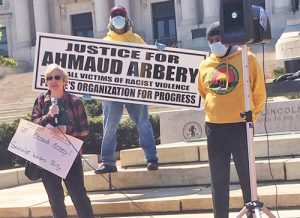
Militant editor John Studer announced May 6 that the six-week drive to win new readers to the Militant and books by Socialist Workers Party leaders and other revolutionists and for contributions to the $115,000 Militant Fighting Fund had been extended two weeks to run through June 2. The extension allows supporters of the paper to take advantage of opportunities to expand the reach of the paper and its coverage of workers’ struggles to defend wages and working conditions.
SWP campaigners talk to working people in small towns and rural areas as well as big cities, at their doorsteps, Walmart parking lots, on taxi lines, at truck stops and at protest actions. They learn about what fellow workers face and discuss together what is needed to unite working people so we can stand up to the bosses’ attempt to make us pay for the capitalist crisis.
Party members who work at retail stores, on railroads and at other workplaces use the drive to advance discussions with fellow workers about what can be done and to strengthen fights they are part of on the job.
Resistance and discussion
Fights by truckers and other working people show it is possible to resist the bosses’ assaults. More workers are refusing to accept the myth peddled by Democratic and Republican politicians that in today’s depression conditions, workers and bosses “are all in this together.”
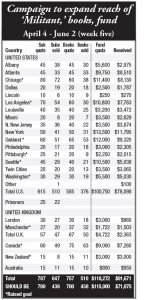 Sanitation workers in New Orleans are refusing to back down from their strike over low pay, long hours and dangerous working conditions despite the bosses’ attempt to bring in prisoners to act as strikebreakers.
Sanitation workers in New Orleans are refusing to back down from their strike over low pay, long hours and dangerous working conditions despite the bosses’ attempt to bring in prisoners to act as strikebreakers.
Protests of several hundred in Georgia against the killing of Ahmaud Arbery — a Black man murdered by vigilantes while he was jogging — are another example of working people refusing to subordinate struggles against injustice to government lockdowns imposed in the name of combating coronavirus. SWP members and other distributors of the Militant report a thirst for discussing the road forward to defend the interests of working people.
In Albany, New York, in mid-May, several workers came out of a Walmart there after work to greet SWP presidential and vice presidential candidates Alyson Kennedy and Malcolm Jarrett. One worker described working in the freezer stocking shelves without any gloves.
“Walmart should be supplying gloves,” Kennedy replied. “Working people can come together and stand up to the bosses to make sure they don’t get away with this.” She pointed to recent examples where workers at the retail giant had organized to resist the bosses’ demands.
Kennedy and Jarrett also went to Vermont, where they helped sign up the three presidential electors needed to get the Socialist Workers Party ticket on the ballot there in November.

Merylyn Griffith, a retired teacher and one of the electors, joined Kennedy talking to workers outside a local Walmart.
Retired rail worker Walter Klinger agreed to be an elector after speaking with Kennedy in Pownal. He described how wide layers of working people in the area had never recovered from the impact of the financial crash and social crisis in 2008. “This system doesn’t work, we need a new system,” Klinger said.
In Millerton, New York, a village of less than 1,000 people, train engineer and conductor Travis Zuluaga told the two SWP candidates how rail bosses have increased the length of freight trains over the last eight years.
“One hundred cars was considered a long train when I hired out, today it’s not uncommon to have trains over 200 cars in length even as more rail workers are being laid off,” Zuluaga said.
Down from the standard five-man crews 40 years ago, many trains today run with just an engineer and a conductor. Rail workers have fought against these cuts, which jeopardize the safety of both train crews and surrounding communities.
Fight for rail safety
“My campaign calls for limiting the train length to no more than 50 cars, and having four person crews,” Kennedy said.
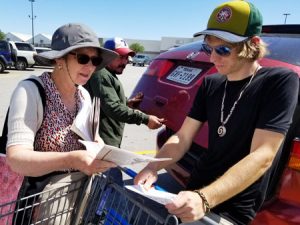
“How can we get everyone to unite?” Zuluaga asked.
“It starts with standing up,” Kennedy replied “The more we get some victories, the more confidence we gain.”
Kennedy told Zuluaga about battles by truck drivers in Minneapolis in 1934 that beat back cop and employer assaults to win a union and how SWP members in the union leadership helped lead the union to fight for farmers, independent truckers and the unemployed. That struggle shows that with leadership they deserve, working people gain confidence in themselves, build fighting unions and extend a hand to others fighting boss and government attacks.
Zuluaga renewed his subscription to the Militant and picked up Teamster Rebellion by Farrell Dobbs, a central leader of those union battles and of the Socialist Workers Party. He also got copies of The Turn to Industry: Forging a Proletarian Party and Are They Rich Because They’re Smart? Class, Privilege, and Learning Under Capitalism by SWP National Secretary Jack Barnes. Both titles explain how working people can transform ourselves in the course of revolutionary struggles and the kind of party we need to build to lead millions to put an end to capitalist rule. (See ad on page 6 for special book offers during the drive.)
